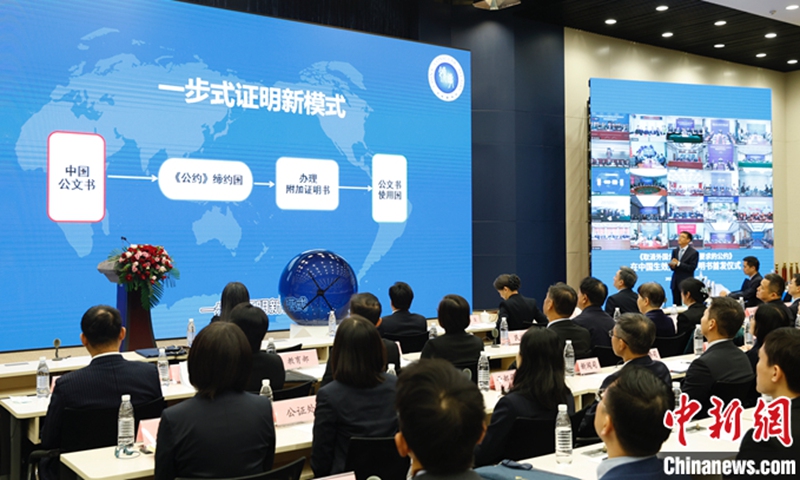The Convention Abolishing the Requirement of Legalization for Foreign Public Documents, or the Apostille Convention, entered into force in China on Tuesday, which, according to Chinese diplomatic officials, will greatly reduce the time and economic cost of cross-border transfer of Chinese and foreign documents, and further optimize China’s business environment.
On March 8, China acceded to the 1961 Hague Convention Abolishing the Requirement of Legalization for Foreign Public Documents. On Tuesday, the Chinese Foreign Ministry held a ceremony to mark the implementation of the convention in China.
In the future, the cross-border circulation of documents between China and contracting states of the convention will no longer require the traditional “dual authentication” process. Instead, a new one-step certification model based on the Apostille certificate will be implemented under the framework of the convention.
On Tuesday, Director-General of the Department of Consular Affairs of the Foreign Ministry Wu Xi introduced that the convention will bring three major benefits. Firstly, it will greatly reduce the time required for international document processing. After joining the convention, the time needed to process a document can be reduced from approximately 20 working days to just a few working days, an average reduction of about 90 percent.
Secondly, it will significantly reduce the cost of document certification. Joining the convention will eliminate consular authentication fees and related intermediary service fees for Chinese and foreign individuals and businesses. It is estimated that joining the convention will directly save at least 300 million yuan ($41.18 million) in certification costs for Chinese and foreign individuals and businesses each year.
Thirdly, it will improve China’s business environment. After joining the convention, companies from contracting states intending to invest in China or engage in exports will no longer need consular authentication for commercial documents. Additionally, over 70 percent of commercial documents involved in China’s export trade will also benefit from this change.
Xiao Jianhua, a professor from the School of Law of Beihang University, told the Global Times on Tuesday that before joining the convention, public documents between China and other countries had to be notarized or authenticated by the embassy or consulates of the respective country in order for another country to recognize them.
After joining the convention, the mutual authentication procedures for civil and commercial documents such as marriage registration, corporate registration, and other public documents will be simplified, Xiao said.
In addition, in foreign-related judicial procedures, if the evidence submitted by the parties is a public document, there is no need to notarize it abroad or authenticate it at an embassy or consulate since it can be directly recognized by the court of the receiving country. This will greatly facilitate civil and commercial exchanges, business investments, and save more time in foreign-related judicial procedures, Xiao noted.
He Zhipeng, dean of the Law School and executive director of the Human Rights Center at Jilin University, told the Global Times that the convention can facilitate communication and enhance the efficiency of cross-border exchanges for the general public.
The Hague Convention is the most widely applicable and heavily subscribed international treaty under the framework of the Hague Conference on Private International Law. As of October 31, there are 125 contracting parties, accounting for three-fifths of the total number of countries and regions in the world. These include the European Union member states, the US, Japan, South Korea, Germany, Australia, Russia, and most of China’s major trading partners and countries participating in the Belt and Road Initiative.
(Global Times)




